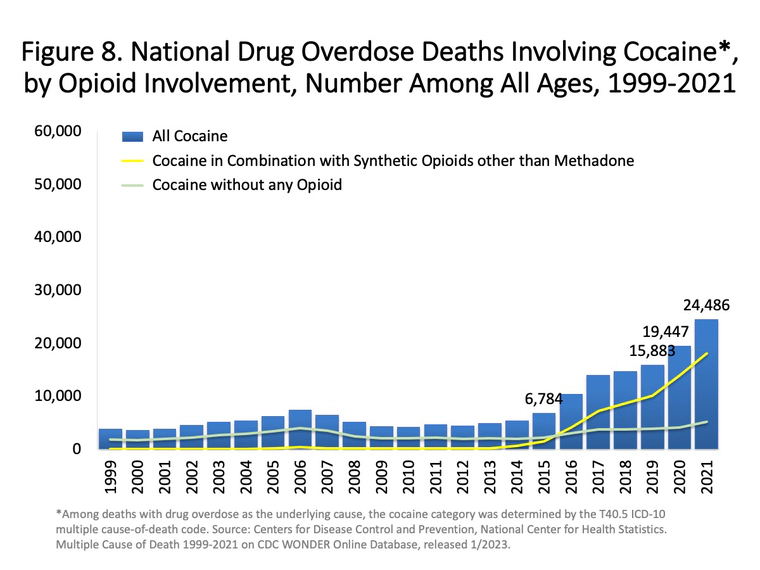What are the Effects of Using Cocaine?
Cocaine abuse and addiction are on the rise, highlighting a need to educate the public about the drug’s harmful effects and increasingly lethal nature.

Any illicit drug poses risks for physical and mental harm to users. However, millions of Americans still experiment with drugs, particularly when they’re not properly informed and educated about the harms associated with drug use. For example, those who use cocaine put themselves at risk for serious heart health conditions, brain damage, and damage to their nasal passages, lips, mouth, and lungs. They also put themselves at risk for fatal overdoses, especially when fentanyl and other synthetic opioids have been mixed into their cocaine. American people must be educated about the effects of using cocaine to keep themselves and their loved ones safe.
Short-Term Effects of Using Cocaine
The effects of cocaine appear quickly and disappear within a few minutes to an hour. People who use cocaine often feel euphoric, energetic, talkative, mentally alert, and hypersensitive to sight, sound, and touch. They may feel they don’t need to eat or sleep, and they may go extended periods without food, water, or rest.1
Some short-term effects of using cocaine include constricted blood vessels and dilated pupils. Users often experience increased body temperature, heart rate, and blood pressure. People who use cocaine experience unpleasant side effects like bizarre, erratic, and violent behavior. Some experience restlessness, irritability, anxiety, panic, paranoia, tremors, vertigo, and muscle twitches.
The health effects of using cocaine, even just once, are also extremely concerning. Users often experience harmful cardiovascular effects, such as disturbances in heart rhythm and even heart attacks (which can easily be fatal). It’s also common for users to experience neurological effects, including headaches, seizures, strokes, and coma. Gastrointestinal complications are also common, including abdominal pain and nausea. Cocaine-related deaths can occur as a result of cardiac arrest, seizures, and cocaine-induced strokes and comas.
Long-Term Effects of Using Cocaine

It’s possible to experience serious physical, mental, emotional, and psychological harm from using cocaine just once. However, people who use the drug over time and develop an addiction only put themselves at even greater risk for adverse effects. According to the National Health Service, the long-term effects of using cocaine include:2
- Dependency (addiction)
- Impotence and other sexual dysfunction
- Damage to the heart, potentially life-threatening
- Mood swings, which can be violent and unpredictable
- Malnutrition and weight loss due to suppressed appetite
- Poor sleeping and eating patterns, poor diet, and insufficient hydration
- Difficulties with mental health, mood, emotion, and psychological condition
- Damage to the lips, mouth, teeth, gums, and lungs caused by smoking cocaine
- Needle-related injuries like infections, sores, and lesions as a result of intravenous use
Long-term cocaine users can also expect to experience short-term harm (effects of cocaine use that occur during and immediately after cocaine usage). For example, cocaine addicts struggle with anxiety, dilated pupils, increased heart rate, paranoia, and restlessness, all of which can occur during and after cocaine use.
Soft Tissue Damage a Serious Concern
One particularly concerning long-term harm associated with cocaine addiction is soft tissue damage. When snorted, cocaine causes blood vessels to contract, which reduces blood flow to the nose. Addicts who use cocaine frequently can damage their nasal structure and tissues. That can cause holes or perforations in the septum (the cartilage between the nostrils). Further, when cocaine is cut with other toxic chemicals, nose and nasal passage damage can escalate rapidly. When cocaine addicts don’t get help, they risk total nasal deterioration, loss of smell, and loss of skin, cartilage, and overall nasal structure. Severe cases will require prosthetic surgery.
The Scope of Cocaine Addiction in the U.S.
Despite the harmful short- and long-term effects of using cocaine, data shows that the use of the drug is on the rise. The National Institute on Drug Abuse reports about 4.8 million Americans now use cocaine annually, or about 1.7% of the population over age 12. About 0.5% of high school students use cocaine at least once yearly. NIDA reports about 1.4 million Americans over age 12 are addicted to cocaine, meaning they use it often and cannot stop using it on their own.3
Fentanyl and Cocaine Deaths
The most concerning harm connected to cocaine addiction is the increasingly lethal nature of the drug. NIDA reports about 24,486 deaths from an overdose involving cocaine in 2021, the highest number of cocaine deaths ever recorded.4

Image courtesy of nida.nih.gov
It’s important to mention that most of the recent escalation in cocaine deaths can be attributed to the introduction of fentanyl and other synthetic opioids into the cocaine supply. For example, while 24,486 people died from cocaine overdoses in 2021, only about 8,000 deaths were caused by cocaine alone. The other 16,000+ deaths involved cocaine mixed with another opioid, usually fentanyl, and usually without the addict knowing the cocaine they were using was tainted with a potent, life-threatening dose of synthetic opioids.
The Need for Addiction Treatment
Drug trends change over time, and it is important to monitor such trends, as doing so helps inform public health policy and treatment efforts. As cocaine abuse becomes more prevalent across America, people should become informed of the short- and long-term effects of using cocaine. The more knowledge they have of this drug’s harmful nature, the more they’ll be able to protect themselves and their loved ones.
As cocaine experimentation becomes more widespread and as cocaine use becomes more dangerous due to the introduction of potent opioids into cocaine batches, Americans are more at risk for cocaine-related harm than perhaps ever before. Ensuring one’s loved ones are educated about the harmful effects of cocaine will go a long way in preventing experimentation with this drug. And for those who are already using cocaine but who cannot stop using it on their own, they must seek help at qualified residential drug rehab centers before it is too late.
Sources Cited:
-
NIDA. “What are the short-term effects of cocaine use?” National Institute on Drug Abuse, 2016. nida.nih.gov ↩︎
-
NHS. “Cocaine.” National Health Service, 2023. nhsinform.scot ↩︎
-
NIDA. “What is the scope of cocaine use in the United States?” National Institute on Drug Abuse, 2016. nida.nih.gov ↩︎
-
NIDA. “Drug Overdose Death Rates.” National Institute on Drug Abuse, 2023. nida.nih.gov ↩︎





 ®
®